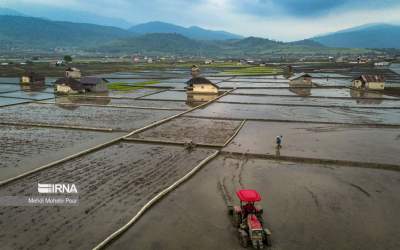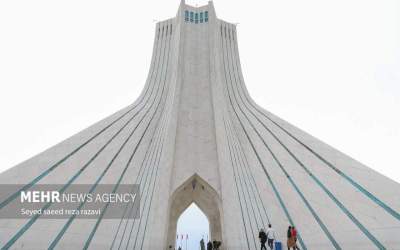Thursday 1 November 2018 - 13:58
Story Code : 325292
Future Asian development relies on splitting from US sanctions on Iran - Scholar
Sputnik - The Indian government has rushed to open the port of Chabahar in southeastern Iran before new US sanctions begin in November. While India has sought a waiver from the US for trade at the port, an Indian historian told Sputnik that the sanctions will fail, and the countries of southern Asia will find a new future separate from the US.
India has sunk $500 million into�developing two ports in�Chabahar and another $2 billion to�build a rail link with�the city of�Zahedan, capital of�Iran's Sistan-Baluchistan Province, 430 miles inland. A further project will link Zahedan with�Zaranj, just across�the Afghan border, and provide a transport corridor for�iron ore coming out�of the Hajigak mining concession, granted to�India in�2016 in�central Afghanistan, Sputnik�reported.
However, that project has now been put in�danger by�the US pulling out�of the Joint Comprehensive Plan of�Action (JCPOA) in�May, a 2015 agreement that lowered economic sanctions against�Iran in�exchange for�a cessation in�their nuclear weapons program. US President Donald Trump, claiming violations by�the Iranians, unilaterally pulled out�of that agreement, and the US Treasury reinstated strangling economic sanctions in�two waves: the first went into�place in�August, and the second, stronger restrictions will began on�November 4.
Despite the US withdrawal, the remaining signatories to�the JCPOA�� Britain, France, Germany, China and Russia�� have pledged to�continue to�operate under�its guidelines, effectively snubbing US threats of�punishment if they violate US-imposed trade restrictions. Other countries, from�Iraq to�Turkey and beyond, have also balked at�the idea of�ending trade with�Iran, although some have rearranged their trading arrangements, such as�the Chinese, who now agree to�buy Iranian oil only if it's shipped to�them in�Iranian tankers that assume the costs and risks involved, Sputnik�reported.
Radio Sputnik's�Loud and Clear�spoke with�Vijay Prashad, director of�the Tricontinental: Institute for�Social Research, chief editor of�LeftWord Books and author of�numerous books including "Red Star Over the Third World" and "Everybody Was Kung Fu Fighting: Afro-Asian Connections and the Myth of�Cultural Purity," about�the issue of�Chabahar, what the port means for�India, and where US sanctions against�Iran will push the region politically and economically.
?Prashad explained that Afghanistan, being landlocked in�Central Asia, relies on�surrounding countries to�permit it to�import and export goods. Hemmed in�on all sides by�mountains and deserts, that's not an easy feat regardless of�the direction of�shipment. While it's traditionally relied upon�either Pakistan or China (via Uzbekistan and Kyrgyzstan) for�access to�the sea, Prashad noted that in�the last 10 to�15 years, Afghanistan has steadily increased its trade with�Iran, even buying Iranian oil during�the years of�sanctions against�Iran.
In turn, India's rapidly growing economy increasingly seeks access both to�Afghan goods and to�Central Asian markets further inside�the continent. Iran, likewise, has sought "to deepen its regional partners" in�order to�frustrate any attempts by�the US to�isolate it once more, such as�was the case between�2006 and 2015, when the United Nations had placed economic sanctions on�trading with�the country.
And that's exactly what's happened, Prashad said: US efforts to�place Iran back in�the vise of�sanctions have been "frustrated by�these regional entanglements."
That's also why India is now seeking to�obtain a waiver from�US sanctions for�cargo traffic through�the port of�Chabahar. The second round�of US sanctions is due to�begin November 4 and will include punishments for�those who buy Iranian oil, among�other exports.
"In a sense, the United States government is like�a human being who's put its hand inside�a bees' nest and is unable to�extricate it, you know, constantly getting bitten over�the last 17 years around�the question of�what to�do about�Afghanistan. There has been no strategic clarity over�Afghanistan and the US war there, and indeed, this is demonstrated by�the fact that the United States has decided to�once again isolate Iran, which had played a very important stabilizing role in�parts of, particularly, eastern Afghanistan."
"The idea that the United States is going to�look at�this, whether from�the Pentagon side or the White House side, rationally, I think should be set aside. I think even the Pentagon has not been bold in�its understanding that this war in�Afghanistan is an utter failure and that Iran has to�play a very important stabilizing role alongside, I think, not a choice between�India or China but�alongside India, China and Pakistan. All four of�these regional countries have to�play a role in�the stabilization of�Afghanistan. I think there is an appetite in�the new Pakistani government for�something like�this. I think that, if the Indian government is shown the road, it might accept that there is a way for�India, Pakistan, Iran and China to�stabilize Afghanistan."
"You've got to�understand that India has got a very large stake in�an iron ore mine in�Afghanistan. This is a very important raw material for�the Indian economy, for�Indian big business. And Indian big business has been putting pressure on�Delhi to�make some kind of�deal with�the United States to�get this port out�of the sanctions register and to�bring some stability in�Afghanistan. Business doesn't always like�war, even though war is extremely good for�business."
However, "it's not just this port," he said. "The Chabahar port plays a very important role in�India's strategic interests�� and it should be said that there is an element of�minor power jostling here, as�well: because the Chinese and the Pakistanis have developed the port at�Gwadar, which is just down�the road from�Chabahar, another port that would link Afghanistan to�the Indian Ocean�� but�of course through�Balochistan, an area, again, of�instability. But it's not just this port: it's also oil. And it's again not just India: it's China, it's Japan, Sri Lanka�� I mean, countries in�the Indian Ocean and in�the South China Sea rely on�Iranian oil. And they are unwilling to�pivot, and each of�these countries are looking�� and they've even started looking, spoken of, creating an alternative banking system."
"I think it's important to�recognize that the US government cannot prevent people from�buying Iranian oil. That's not sanctioned. What's sanctioned is the ability to�pay for�it�� in�other words, the use of�American-dominated banking systems and of�the SWIFT network, the wire service that is based in�Belgium. I mean, that's the problem: the problem isn't getting the oil to�your country, it's how do you pay for�it. So these countries, including Japan, have been openly talking about�an alternative banking system. It seems to�me that when the Trump administration puts these new sanctions in�place in�November, it's going to�find that very large parts of�Asia, and even the European Union, is not willing to�go along�with the sanctions, and they are looking for�ways to�go around�them. So I'm afraid these sanctions, which are very tough in�the letter, might end up�being a damp squib for�the Trump administration."
Prashad said that "countries like�India are going to�be left in�the cold" if the BRICS (Brazil, Russia, India, China and South Africa) block falters. He noted that Brazil's new president, Jair Bolsonaro, has spoken of�leaving the block, and that Russia and China seem to�be "going their own way," forming a partnership between�themselves on�economic, military and geopolitical matters. In such a situation, India is "going to�have to�decide: do they want to�be subordinate allies of�the United States, or do they want to�have some sort of�regional framework by�which they can improve the situation of�their own economy, whether it's just the elites or even the middle class? So I think with�the destruction of�the BRICS block, which is imminent, India is going to�have to�seriously consider its regional landscape, and that's going to�mean coming to�terms with�the overture from�Pakistan," he said, noting that Pakistani President Imran Khan has made an overture to�the Indian government.
# Tags










